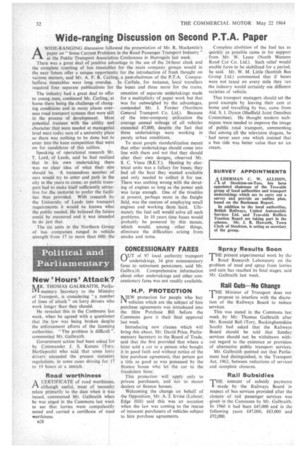Wide-ranging Discussion on Second P.T.A. Paper
Page 34

If you've noticed an error in this article please click here to report it so we can fix it.
AWIDE-RANGING discussion followed the presentation of Mr. R. Mackenzie's paper on "Some Current Problems in the Road Passenger Transport Industry" at the Public Transport Association Conference in Harrogate last week. There was a great deal of positive advantage in the use of the 24-hour clock and the complete resetting of bus timetables for the main company groups would in the near future offer a unique opportnnity for the introduction of fresh thought on various matters, said Mr. A. F. R. Carling, a past-chairman of the P.T.A. Comprehetcsive timetables were long overdue. In Carlisle, for instance, local travellers required four separate publications for the buses and three more for the trains.
The industry had a great deal to offer to young men, continued Mr. Carling, at home there being the challenge of changing conditions and in many places overseas road transport systems that were still in the process of development. Most potential trainees with the ability and character that were needed at managerial level were today sure of a university pl ce so there was nothing to be done but to enter into the keen competition that w nt 011 for candidates of this calibre. Speaking of operational research . T. Lord, of Leeds, said he had realized that in his own undertaking there was no clear idea of what their aim should be. A tremendous number of cars would try to enter and park in the city in the years to come, so public transport had to make itself sufficiently attractive for the motorist to prefer the facilities thus provided. With research by the University of Leeds into transport requirements it would be known what the public needed. He believed the future could be measured and it was intended to do just that. The six units in the Northern Group of bus companies ranged in vehicle strength from 17 to more than 600; the retention of separate undertakings made for a multiplicity of paper work but that was far outweighed by the advantages, contended Mr. J. Forster (Northern Genera! Transport Co. Ltd.). Because of the inter-company utilization the average annual mileage of all vehicles exceeded 47,000, despite the fact that three undertakings were working in purely urban conditions. To most people standardization meant that other undertakings should come into line with them and not that they should alter their own designs, observed Mr. S. C. Vince (13.E.T.). Heating by electrical units was a fallacy for buses; they had all the heat they wanted available and only needed to collect it for use. There was nothing wrong with the derating of engines so long as the power unit was large enough. One of the troubles at present, perhaps more in the freight field, was the custom of employing small engines and working them hard. Ultimately the fuel cell would solve all such problems. In 10 years time buses would probably be powered by this means, which would, among other things, eliminate the difficulties arising from smoke and noise. Complete abolition of the fuel tax as quickly as possible came in for support from Mr. W. Leese (North Western Road Car Co. Ltd.). Such relief would enable fares to be stabilized for a period, he said. Mr. W. M. Little (Scottish Bus Group Ltd.) commented that if buses were not taxed on every mile they :an the industry would certainly use different varieties of vehicle. That transport managers should set the good example by leaving their cars at home and travelling by bus, came from Aid. S. I. Dyson (Sheffield Joint Omnibus Committee). He thought modern techniques were needed to improve the image of public road transport, commenting that among all the television slogans, he ' had never seen one which insisted that a bus ride was better value than tin ice cream.




























































































































